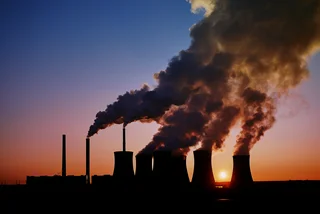Europe's energy dependency on Russia is moving to the forefront of discussions about the West's response to the invasion of Ukraine. Following the freezing of Russian assets held abroad, Russian President Vladimir Putin has demanded that payments for Russian energy are made in roubles; a notion which Czech ministers reject, along with their counterparts elsewhere in the EU.
As such, a situation in which Russian gas stops flowing to Europe is becoming a firmer possibility. Czech Minister of Industry and Trade Josef Síkela said late last week that Czech companies will not pay gas in roubles as the Kremlin demands, and that plans are being drawn up for all possible scenarios, including a complete halt to supplies from Russia.
An analysis from a team working with the French government has uncovered how much the complete cessation of Russian gas and oil supplies would cost citizens of EU countries. Czechia was forecast to be one of the worst-affected nations, with a sudden loss of Russian energy depriving it of around one percent of its economic output.
This would result in losses to the economy totaling around CZK 66 billion, translating into approximately CZK 7,600 per inhabitant.
The Czech Republic has gas reserves to last a month, and oil reserves to last for over 90 days, according to Síkela. In the event of disruption to Russian supplies, the country would look to import Norwegian energy as a replacement, which could cover between a quarter and a third of energy needs over the winter.
Síkela has stressed the importance of EU cohesion, saying that a meeting this week will see ministers “finalize what we have already agreed on, namely the details of joint energy purchases within the European Union and the coordination of winter preparations. The Czech Republic has supported this unified approach at the EU level from the beginning.”
The Czech Republic’s firm stance is admirable given the scale of the country’s dependency on Russian energy. An analysis by economic news portal E15 has shown that Czechia gets 86 percent of its gas from Russia, one of the highest proportions of any country in the EU. It meanwhile gets 35 percent of its oil from Russia, which is close to the EU average.
By contrast, Slovakia’s Economy Minister Richard Sulík said on Sunday that the country cannot afford to do without Russian gas and will pay in roubles if necessary. Germany recently released plans for dealing with reduced supplies, including energy rationing in the worst-case scenario.
The one percent economic downturn for Czechia predicted by analysts in the event of a complete stop to Russian energy supplies is due to the effect which the situation would have on heavy industrial sectors which drive the Czech economy. Automotive, engineering and construction sectors are energy-intensive, and make heavy use of petroleum-based materials.
What are the alternatives to Russian energy? Ambitious cooperation plans between the U.S. and the EU have already been agreed, but practical issues with shipping liquified natural gas from America mean it’s not viable as a complete short-term replacement for Russian gas.
Talks have also been held with Gulf states such as Saudi Arabia and the UAE about increasing energy supplies to Europe. Yet these plans are also fraught with difficulty. Oil refineries are optimized to work with specific oil qualities, meaning it’s not possible for them to switch from processing Russian to Middle Eastern oil overnight.
It’s for reasons such as this that German Chancellor Olaf Scholz said in late March that cutting off Russian oil and gas supplies “from one day to the next would mean plunging our country and the whole of Europe into a recession.”
In the long term, the EU wants to cut out Russian energy through an accelerated switch to renewables. This will be easier for some countries than others. For example, renewable energy already accounts for two-thirds of national energy supply in Denmark, but only around 12 percent in the Czech Republic.
Considering these factors, and Czechia’s heavy energy dependency on Russia, the country’s rejection of Putin’s roubles-for-gas scheme is brave. Putin knows he has the EU in a bind over oil and gas supplies, and hopes to split the bloc by exposing differences in attitudes towards energy uncertainty. In this context, Czechia is again demonstrating its commitment to the western cause.












 Reading time: 3 minutes
Reading time: 3 minutes 



























